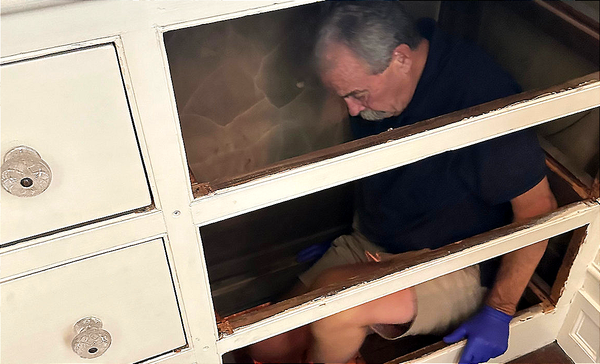Going to Disneyland without giving them your data

Janet Vertesi writes about trying to go to Disneyland with her family while remaining anonymous: "Once upon a time, you could just go to Disneyland. You could get tickets at the gates, stand in line for rides, buy food and tchotchkes, even pick up copies of your favorite Disney movies at a local store. It wasn’t even that long ago. The last time I visited, in 2010, the company didn’t record what I ate for dinner or detect that I went on Pirates of the Caribbean five times. It was none of their business. But sometime in the last few years, tracking and tracing became their business. Like many corporations out there, Walt Disney Studios spent the last decade transforming into a data company."
$500 million Ponzi scheme preyed on Mormons
The Las Vegas attorney, then 49, had been anticipating this visit for months, he would tell an FBI hostage negotiator. He’d already drafted letters to his wife and four children, explaining what he could and describing how much he loved them. On this Thursday in March, Beasley knew his time was up. He placed the letters upstairs on the desk in his office. Then, alone in the house, he went to the front door. One of the agents — identified only as “J.M.” in a detailed criminal complaint filed March 4 in the U.S. District Court of Nevada — opened his suit jacket and flashed his badge. Beasley stepped fully into the doorway. He held a loaded pistol against his head.

What the people who were buried in bogs can tell us about their lives
Of the 57 bog people whose cause of death could be determined in Dr. van Beek’s study, at least 45 met violent ends, and quite a few were bludgeoned or suffered mutilation and dismemberment before they died. Tollund Man, dating to the fifth century B.C. and dredged from a Danish peat bog in 1950, was hanged. Bone arrowheads were found embedded in the skull and sternum of Porsmose Man, recovered from peat elsewhere in Denmark. Seven victims appear to have been slain by several means, a practice that scholars call "overkilling."

The ingenious ways people in prison use forbidden cell phones
News stories often describe all the bad things people do with contraband phones in prison, like trafficking drugs, making threats and running scams. While it’s true those things can happen, a lot of people in prison also use their forbidden cell phones for good. Some use them to self-publish books or take online college classes. Others become prison reform advocates, teach computer skills, trade bitcoin or write legal briefs. I’ve seen a whole plethora of savvy and creative uses that fly in the face of stereotypes about people behind bars. “Our cell phones have saved lives,” a man in prison in South Carolina told me.

Archeologists find gems that fell down the drain at ancient Roman pool
As many as 30 semi-precious stones have been discovered by archaeologists almost 2,000 years after their owners lost them at a site in modern-day Carlisle, just behind Hadrian’s Wall. The stones had dropped out of their ring settings, their glue probably weakened in the steamy baths. They were simply flushed into the drains when the pools and saunas were cleaned. Their loss would have been painful as these were engraved gems, known as intaglios. They bear images whose extraordinary craftsmanship suggests they would have been expensive items in their day – the late 2nd century or 3rd century.

Nine-year-old who got profiled by the police gets honored by Yale
Yale invited Bobbi Wilson – known as "Bobbi Wonder" among her family and friends – to tour the university after hearing about an incident in which a neighbor reported Bobbi to police as a suspicious person. At the time, Bobbi was collecting lanternflies and using a homemade repellent (water, dish soap, and apple cider vinegar) to kill the insects that were feeding on trees near her home. Spotted lanternflies are extremely harmful to the environment and rampant in New Jersey. She was honored for her efforts by the Yale School of Public Health.

When you go skating with friends but you're not very good
Me on the ice rink for the first time..😅 pic.twitter.com/1dHqJmesqF
— Buitengebieden (@buitengebieden) January 30, 2023



